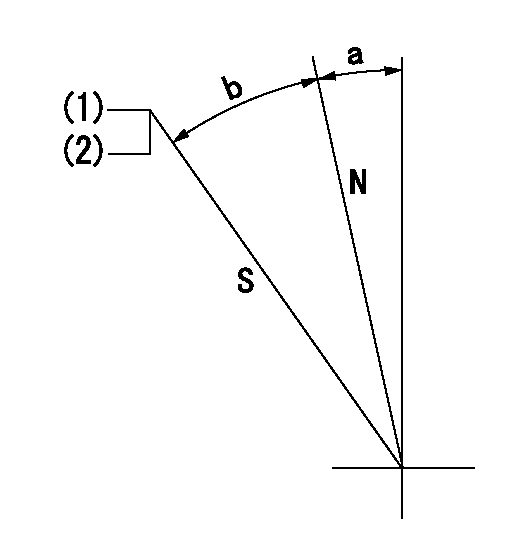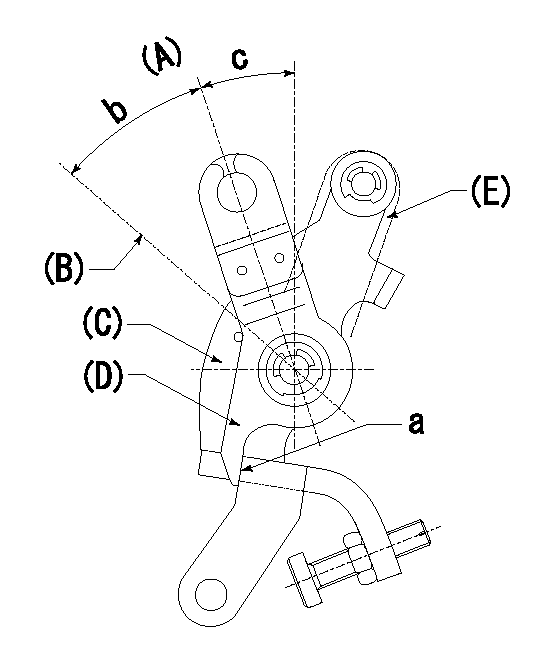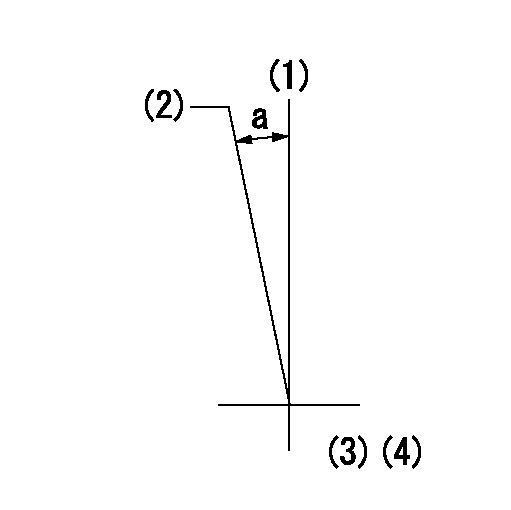Information injection-pump assembly
ZEXEL
101607-1091
1016071091

Rating:
Cross reference number
ZEXEL
101607-1091
1016071091
Zexel num
Bosch num
Firm num
Name
101607-1091
INJECTION-PUMP ASSEMBLY
Calibration Data:
Adjustment conditions
Test oil
1404 Test oil ISO4113 or {SAEJ967d}
1404 Test oil ISO4113 or {SAEJ967d}
Test oil temperature
degC
40
40
45
Nozzle and nozzle holder
105780-8140
Bosch type code
EF8511/9A
Nozzle
105780-0000
Bosch type code
DN12SD12T
Nozzle holder
105780-2080
Bosch type code
EF8511/9
Opening pressure
MPa
17.2
Opening pressure
kgf/cm2
175
Injection pipe
Outer diameter - inner diameter - length (mm) mm 6-2-600
Outer diameter - inner diameter - length (mm) mm 6-2-600
Overflow valve
131424-5520
Overflow valve opening pressure
kPa
255
221
289
Overflow valve opening pressure
kgf/cm2
2.6
2.25
2.95
Tester oil delivery pressure
kPa
157
157
157
Tester oil delivery pressure
kgf/cm2
1.6
1.6
1.6
Direction of rotation (viewed from drive side)
Left L
Left L
Injection timing adjustment
Direction of rotation (viewed from drive side)
Left L
Left L
Injection order
1-5-3-6-
2-4
Pre-stroke
mm
3.2
3.15
3.25
Beginning of injection position
Governor side NO.1
Governor side NO.1
Difference between angles 1
Cal 1-5 deg. 60 59.5 60.5
Cal 1-5 deg. 60 59.5 60.5
Difference between angles 2
Cal 1-3 deg. 120 119.5 120.5
Cal 1-3 deg. 120 119.5 120.5
Difference between angles 3
Cal 1-6 deg. 180 179.5 180.5
Cal 1-6 deg. 180 179.5 180.5
Difference between angles 4
Cyl.1-2 deg. 240 239.5 240.5
Cyl.1-2 deg. 240 239.5 240.5
Difference between angles 5
Cal 1-4 deg. 300 299.5 300.5
Cal 1-4 deg. 300 299.5 300.5
Injection quantity adjustment
Adjusting point
-
Rack position
11.6
Pump speed
r/min
850
850
850
Each cylinder's injection qty
mm3/st.
72.5
70.3
74.7
Basic
*
Fixing the rack
*
Standard for adjustment of the maximum variation between cylinders
*
Injection quantity adjustment_02
Adjusting point
H
Rack position
9.5+-0.5
Pump speed
r/min
275
275
275
Each cylinder's injection qty
mm3/st.
8.3
7.1
9.5
Fixing the rack
*
Standard for adjustment of the maximum variation between cylinders
*
Injection quantity adjustment_03
Adjusting point
A
Rack position
R1(11.6)
Pump speed
r/min
850
850
850
Average injection quantity
mm3/st.
72.5
71.5
73.5
Basic
*
Fixing the lever
*
Injection quantity adjustment_04
Adjusting point
B
Rack position
R1-0.15
Pump speed
r/min
1400
1400
1400
Average injection quantity
mm3/st.
79.5
75.5
83.5
Fixing the lever
*
Injection quantity adjustment_05
Adjusting point
C
Rack position
R1+0.65
Pump speed
r/min
500
500
500
Average injection quantity
mm3/st.
71.5
67.5
75.5
Fixing the lever
*
Injection quantity adjustment_06
Adjusting point
I
Rack position
14.8+-0.
2
Pump speed
r/min
100
100
100
Average injection quantity
mm3/st.
120
100
140
Fixing the lever
*
Rack limit
*
Timer adjustment
Pump speed
r/min
1150
Advance angle
deg.
0.5
Timer adjustment_02
Pump speed
r/min
1200
Advance angle
deg.
0.9
0.4
1.4
Timer adjustment_03
Pump speed
r/min
1380
Advance angle
deg.
5
4.5
5.5
Remarks
Finish
Finish
Test data Ex:
Governor adjustment

N:Pump speed
R:Rack position (mm)
(1)Torque cam stamping: T1
(2)Tolerance for racks not indicated: +-0.05mm.
(3)RACK LIMIT: RAL
----------
T1=F14 RAL=14.8+-0.2mm
----------
----------
T1=F14 RAL=14.8+-0.2mm
----------
Speed control lever angle

F:Full speed
I:Idle
(1)Stopper bolt set position 'H'
----------
----------
a=18.5deg+-5deg b=(40deg)+-3deg
----------
----------
a=18.5deg+-5deg b=(40deg)+-3deg
Stop lever angle

N:Pump normal
S:Stop the pump.
(1)Pump speed = aa and rack position = bb (non-injection rack position)
(2)Set the stopper bolt (confirm non-injection).
----------
aa=1400r/min bb=6.9-0.5mm
----------
a=11.5deg+-5deg b=25deg+-5deg
----------
aa=1400r/min bb=6.9-0.5mm
----------
a=11.5deg+-5deg b=25deg+-5deg
0000001501 RACK SENSOR

V1:Supply voltage
V2f:Full side output voltage
V2i:Idle side output voltage
(A) Black
(B) Yellow
(C) Red
(D) Trimmer
(E): Shaft
(F) Nut
(G) Load lever
1. Load sensor adjustment
(1)Connect as shown in the above diagram and apply supply voltage V1.
(2)Hold the load lever (G) against the full side.
(3)Turn the shaft so that the voltage between (A) and (B) is V2.
(4)Hold the load lever (G) against the idle side.
(5)Adjust (D) so that the voltage between (A) and (B) is V2i.
(6)Repeat the above adjustments.
(7)Tighten the nut (F) at the point satisfying the standards.
(8)Hold the load lever against the full side stopper and the idle side stopper.
(9)At this time, confirm that the full side output voltage is V2f and the idle side output voltage is V2i.
----------
V1=3.57+-0.02V V2f=3+0.05V V2i=1+0.1V
----------
----------
V1=3.57+-0.02V V2f=3+0.05V V2i=1+0.1V
----------
0000001601 MICRO SWITCH
Adjustment of the micro-switch
Adjust the bolt to obtain the following lever position when the micro-switch is ON.
(1)Speed N1
(2)Rack position Ra
----------
N1=400r/min Ra=9.2+-0.1mm
----------
----------
N1=400r/min Ra=9.2+-0.1mm
----------
0000001701 LEVER

(A) Idle
(B) Full speed
(C) Base lever
(D) Accelerator lever
(E) Accelerator lever delivery position
1. Measure speed lever angle
(1)Measure the angle when the accelerator lever (D) contacted the base lever (C) at a.
----------
----------
b=(40deg)+-3deg c=18.5deg+-5deg
----------
----------
b=(40deg)+-3deg c=18.5deg+-5deg
Timing setting

(1)Pump vertical direction
(2)Position of timer's tooth at No 1 cylinder's beginning of injection
(3)B.T.D.C.: aa
(4)-
----------
aa=11deg
----------
a=(1deg)
----------
aa=11deg
----------
a=(1deg)
Information:
Overheating
Possible Causes/Corrections Low Coolant LevelIf the coolant level is too low, not enough coolant will go through the engine and radiator. This lack of coolant will not take enough heat from the engine and there will not be enough flow of coolant through the radiator to release the heat into the cooling air. Low coolant level is caused by leaks or wrong filling of the radiator. With the engine cool, be sure that coolant can be seen at the low end of the fill neck on the radiator top tank. Defective Temperature GaugeA temperature gauge which does not work correctly will not show the correct temperature. If the temperature gauge shows that the coolant temperature is too hot but other conditions are normal, either install a gauge you know is good or check the cooling system with the 4C6500 Digital Thermometer Group. Dirty RadiatorCheck the radiator for debris between the fins of the radiator core which prevents free air flow through the radiator core. Check the radiator for debris, dirt, or deposits on the inside of the radiator core which prevents free flow of coolant through the radiator. Loose Belt(s)Loose fan or water pump belts will cause a reduction in air or water flow. Tighten the belts according to Belt Tension Chart that is shown in Specification Section of this Service Manual. Defective Hose(s)Defective hoses with leaks can normally be seen. Hoses that have no visual leaks can "collapse" (pull together) during operation and cause a restriction in the flow of coolant. Hoses become soft and/or get cracks after a period of time. Hoses must be changed after 50,000 miles or a year of use. The inside can become loose, and the loose particles of the hose can cause a restriction in the flow of coolant. Shunt Line RestrictionA restriction of the shunt line from the radiator top tank to the engine front cover, or a shunt line not installed correctly, will cause a reduction in water pump efficientcy. The result will be low coolant flow and overheating. Shutters Not Opening CorrectlyCheck the opening temperature of the shutters. The shutters must be completely closed at a temperature below the fully open temperature of the water temperature regulators. Also, verify that fan control switches or viscous fans are operating correctly. Defective Water Temperature RegulatorsA regulator that does not open, or only opens part of the way, can cause above normal heating. To test the thermostats, see the Testing and Adjusting Section of this Service Manual. Defective Water PumpA water pump with a loose impeller does not pump enough coolant for correct engine cooling. A loose impeller can be found by removing the water pump, and by pushing the shaft back and pulling it forward. If the impeller has no damage, check the impeller clearance. The clearance between the impeller and the housing is 0.56 to 1.50 mm (.022 to .059 in). Air In Cooling SystemAir can get into the cooling system in different ways. The most common causes are
Possible Causes/Corrections Low Coolant LevelIf the coolant level is too low, not enough coolant will go through the engine and radiator. This lack of coolant will not take enough heat from the engine and there will not be enough flow of coolant through the radiator to release the heat into the cooling air. Low coolant level is caused by leaks or wrong filling of the radiator. With the engine cool, be sure that coolant can be seen at the low end of the fill neck on the radiator top tank. Defective Temperature GaugeA temperature gauge which does not work correctly will not show the correct temperature. If the temperature gauge shows that the coolant temperature is too hot but other conditions are normal, either install a gauge you know is good or check the cooling system with the 4C6500 Digital Thermometer Group. Dirty RadiatorCheck the radiator for debris between the fins of the radiator core which prevents free air flow through the radiator core. Check the radiator for debris, dirt, or deposits on the inside of the radiator core which prevents free flow of coolant through the radiator. Loose Belt(s)Loose fan or water pump belts will cause a reduction in air or water flow. Tighten the belts according to Belt Tension Chart that is shown in Specification Section of this Service Manual. Defective Hose(s)Defective hoses with leaks can normally be seen. Hoses that have no visual leaks can "collapse" (pull together) during operation and cause a restriction in the flow of coolant. Hoses become soft and/or get cracks after a period of time. Hoses must be changed after 50,000 miles or a year of use. The inside can become loose, and the loose particles of the hose can cause a restriction in the flow of coolant. Shunt Line RestrictionA restriction of the shunt line from the radiator top tank to the engine front cover, or a shunt line not installed correctly, will cause a reduction in water pump efficientcy. The result will be low coolant flow and overheating. Shutters Not Opening CorrectlyCheck the opening temperature of the shutters. The shutters must be completely closed at a temperature below the fully open temperature of the water temperature regulators. Also, verify that fan control switches or viscous fans are operating correctly. Defective Water Temperature RegulatorsA regulator that does not open, or only opens part of the way, can cause above normal heating. To test the thermostats, see the Testing and Adjusting Section of this Service Manual. Defective Water PumpA water pump with a loose impeller does not pump enough coolant for correct engine cooling. A loose impeller can be found by removing the water pump, and by pushing the shaft back and pulling it forward. If the impeller has no damage, check the impeller clearance. The clearance between the impeller and the housing is 0.56 to 1.50 mm (.022 to .059 in). Air In Cooling SystemAir can get into the cooling system in different ways. The most common causes are
Have questions with 101607-1091?
Group cross 101607-1091 ZEXEL
Mitsubishi
Mitsubishi
Mitsubishi
Mitsubishi
Mitsubishi
101607-1091
INJECTION-PUMP ASSEMBLY